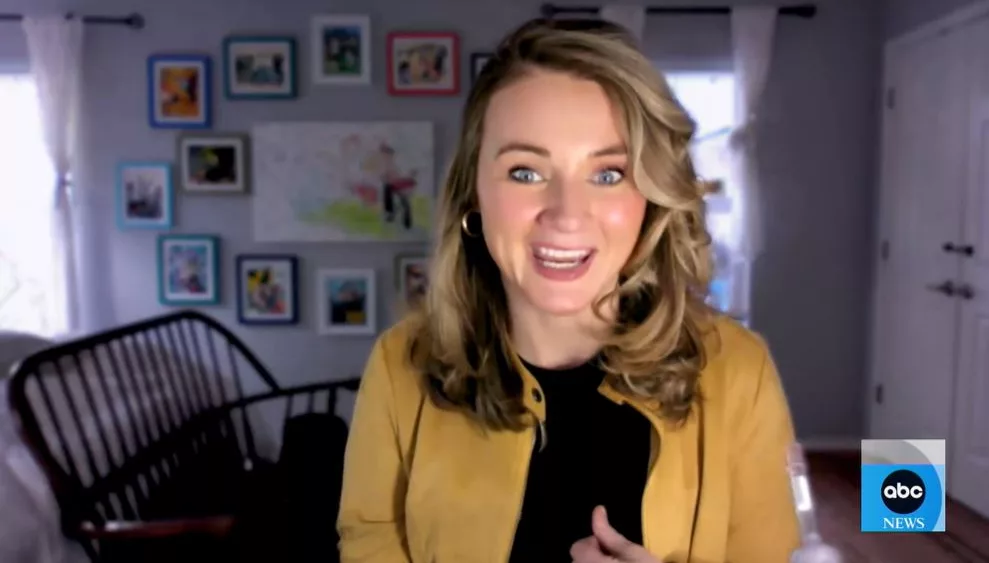
(NEW YORK) — A pediatric nurse from Nebraska is speaking out to share her daughter’s experience with RSV, a respiratory virus that is spiking among children, leaving many pediatric hospitals across the country reaching capacity.
Hannah Brand said her daughter Paitynn was just 2 months old when she developed what seemed like a cold.
Over the course of several days, Brand said Paitynn got progressively worse and started to have difficulty breathing.
“When she would breathe, she was panting and you could see she was almost kind of sweating,” Brand, a mom of three, told ABC News’ Good Morning America. “She was working so hard to take a breath.”
Brand said watching her daughter struggle to breathe was a “red flag” that she needed to be seen by a pediatrician.
“A huge alarm to me was the sinking in of the skin around her ribs, called retractions, and for kiddos, especially in a 2-month-old, retractions is a huge sign of increased work of breathing,” said Brand. “So that was a big, big indicator that something is wrong here, that this is more than just a cold.”
Brand said a pediatrician diagnosed her daughter with RSV, or respiratory syncytial virus, which usually causes mild, cold-like symptoms, but can become serious, especially for infants.
In Brand’s case, her daughter was admitted to a local hospital, and then airlifted to Children’s Hospital & Medical Center in Omaha, Nebraska, over 100 miles away from the family’s hometown.
“I’m used to seeing this every day in other kiddos, but when it came down to it was my daughter experiencing this, it was almost like my nurse brain went out the window and it was mom brain 100% and it was very terrifying,” said Brand. “It was a huge advantage that I knew what to look for and how to intervene should I need to, but at the time I was 100% mom mode and I was very terrified.”
In the hospital’s pediatric intensive care unit, Brand said she saw what many hospitals are experiencing across the country — an overflow of pediatric patients.
Hospitals in more than two dozen states — including Rhode Island, Washington, Colorado, Texas, Ohio, Louisiana, New Jersey and Massachusetts — and the District of Columbia have told ABC News they are feeling the crush of a higher-than-expected rate of certain pediatric infections other than COVID-19.
Nationally, pediatric bed capacity is the highest it has been in two years, with 75% of the estimated 40,000 beds filled, according to the Department of Health and Human Services.
“The hall that we were on was completely full,” said Brand. “Every room had a kid in it.”
Brand said she considers her family “one of the fortunate” ones because Paitynn responded quickly to treatment.
She was put on nasal oxygen to help her breathing and was put under light sedation, which allowed her to rest and improve, according to Brand.
“Once she started that light sedation, she was able to sleep and we noticed immediately on her monitors, her oxygen improved, her heart rate improved,” she said. “As she would sleep, her body was slowly recovering.”
Paitynn was discharged from the hospital after just two days, and continued to improve, according to Brand.
Today, one month after being hospitalized, Brand said Paitynn experiences the occasional coughing spell but is otherwise “back to her old happy self.”
“We do still follow up very closely with her pediatrician just because the risk of her later on maybe developing childhood asthma, reactive airway disease, those kinds of things can be a little bit more increased after they’ve had an RSV diagnosis,” said Brand. “We’ve just had to keep an extra close eye on her.”
Brand said closely monitoring Paitynn has included keeping the infant away from crowds and asking friends and family members to not unnecessarily touch her or kiss her.
She said her advice to other parents and caregivers worried about RSV is to “trust their gut” and to seek medical help.
“If for whatever reason you question the condition of your kiddo or you’re just not comfortable with how they look, trust your gut,” said Brand. “Please take them in to be seen. If you think at all that you’re not comfortable with something, trust that instinct and get them some help.”
What parents should know about RSV
RSV is a contagious virus that can spread from virus droplets transferred from an infected person’s cough or sneeze; from direct contact with the virus, like kissing the face of a child with RSV; and from touching surfaces, like tables, doorknobs and crib rails, that have the virus on them and then touching your eyes, nose or mouth before hand-washing, according to the CDC.
People infected with RSV are usually contagious for three to eight days, but some infants can continue to spread the virus even after they stop showing symptoms, for as long as four weeks, according to the CDC.
Among children, premature infants and young children with weakened immune systems or congenital heart or chronic lung disease are the most vulnerable to complications from RSV.
“Pretty much all kids have gotten RSV at least once by the time they turn 2, but it’s really younger kids, especially those under 6 months of age, who can really have trouble with RSV and sometimes end up in the hospital,” Dr. William Linam, pediatric infectious disease doctor at Children’s Hospital of Atlanta, told ABC News last year. “That’s where we want to get the word out, for families with young children or children with medical conditions, making sure they’re aware this is going on.”
In the first two to four days of contracting RSV, a child may show symptoms like fever, runny nose and congestion.
Later on, the symptoms may escalate to coughing, wheezing and difficulty breathing.
Parents should also be alerted to symptoms including dehydration and not eating, according to Linam.
“Not making a wet diaper in over eight hours is often a good marker that a child is dehydrated and a good reason to seek medical care,” he said. “Sometimes kids under 6 months of age can have pauses when they’re breathing, and that’s something to get medical attention for right away.”
Infants and toddlers can usually recover at home with RSV unless they start to have difficulty breathing, are not eating or drinking, or appear more tired than usual, in which case parents should contact their pediatrician and/or take their child to the emergency room.
At-home care for kids with RSV can include Tylenol and Motrin for fevers, as well as making sure the child is hydrated and eating.
Parents can help protect their kids from RSV by continuing to follow as much as possible the three Ws of the pandemic: wear a mask, wash your hands and watch your distance, according to Linam.
Infants who are either born prematurely (less than 35 weeks) or born with chronic lung disease may benefit from a medication to prevent complications of RSV since they are at increased risk of severe disease. Parents should discuss this with their pediatrician.
Copyright © 2022, ABC Audio. All rights reserved.





